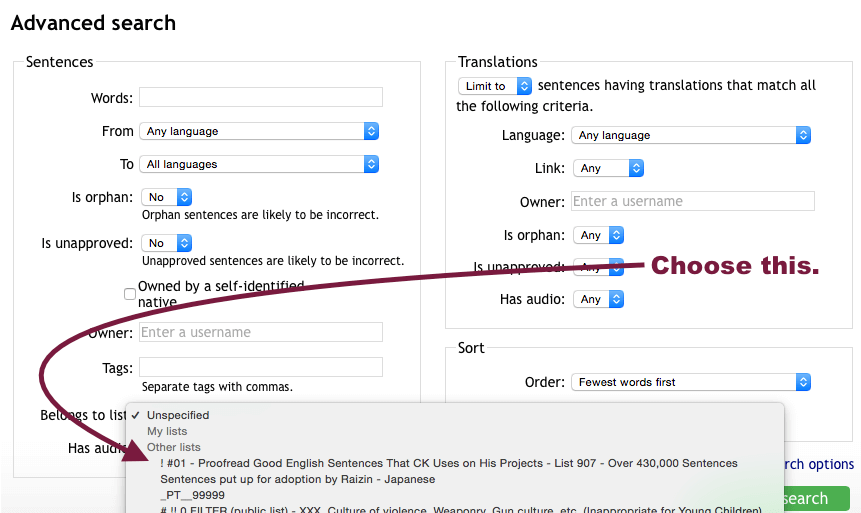List 907 = "! #01 - Proofread Good English Sentences That CK Uses on His Projects - List 907 - Over 800,000 Sentences"
About List 907
- Recommendation
- I recommend studying and translating sentences on List 907 first.
- These sentences have been proofread and are much less likely to contain errors.
- Also, "near duplicates" are not usually added to this list, so you won't be spending time translating such sentences.
- For example, only Tom went to school. is on List 907, and these others are not.
- Bilal went to school.
- Fadil went to school.
- Hassan went to school.
- Mennad went to school.
- Meqqran went to school.
- Ramudu went to school.
- Yanni went to school.
- Ziri went to school.
- For example, only Tom went to school. is on List 907, and these others are not.
- About the 800,000+ English Sentences on List 907
- About 60% of the English sentences in the Tatoeba Corpus are on List 907.
- For the most part, "English sentences with audio" is a sub-set of List 907.
- An explanation about the remaining English sentences not on List 907
- These include sentences that had outright errors.
- These include sentences that didn't sound like what a native speaker would say, even though the intended meaning can be understood.
- These include "near duplicates". (For example, in cases where there are both "Tom swims." and "Mary swims.", usually only the sentences with "Tom" as the subject were put on List 907. -- See bit.ly/tatoebawildcards.)
- These include very long items, usually multiple-sentence entries, that I felt weren't useful for my own projects, so I filtered them out without reading them.
- These obviously also include sentences that I haven't yet proofread.
- Criticism That I Have Received About This List
- A member has criticized me for suggesting that members limit themselves to only translating sentences that I have proofread and selected to use on my own projects.
- While I do not think there is anything wrong with directing members to good sentences, here are likely some reasons people will not like my list.
- I try to not include anything that is obscene or culturally-insensitive since I use these sentences on a website that I aim at people around the world, including school children.
- I try to not include too many near duplicates since my website is aimed at people who can very likely create such near duplicates themselves.
- I try to not include nonsense sentences, strange sentences, factually-inaccurate sentences, etc. Such decisions can be subjective.
- Why I Started This List
- When I first started using the Tatoeba Corpus, I noticed a lot of errors. With so many errors, I did not want to use the whole corpus for any project that was designed for students learning English.
- While at first glance it might seem that all these errors could be corrected, that isn't possible.
- New sentences with errors keep coming in to the database.
- Some "owners" of sentences are resistant to making corrections.
- Some "owners" of sentences get upset when corrections are suggested, so to keep tatoeba.org a friendly place, it is simpler to not make suggestions for corrections.
- Some sentences with errors have too many linked translations that are affected by any change of the English sentence.
- ... and a few other reasons.
- It soon became obvious that it would be a more effective use of my time to proofread and select sentences to use.
- Recently, since the list has grown so large, I have been more careful not to add sentences that are near duplicates of sentences already on the list. Students using my projects can likely very easily create such sentences on their own.
Useful Tatoeba.org Links Based on List 907
Useful Tools for Tatoeba Members Based on List 907
- Find Proofread English Sentences That Are Not Yet Translated
- Search English Limited to Proofread Sentences
- Create a Dashboard of Customized Links Page for Tatoeba.org
Only the "FROM: English" to another language versions utilize List 907.
Projects Based on List 907
These projects use English sentences that are on List 907 that have translations owned by native speakers of the other languages.
How to limit search results to just sentences on List 907
Choose the list when you use the advanced search.

